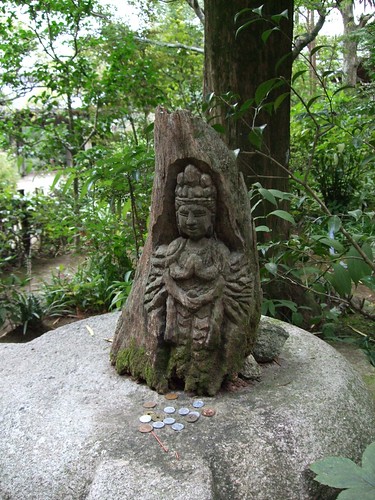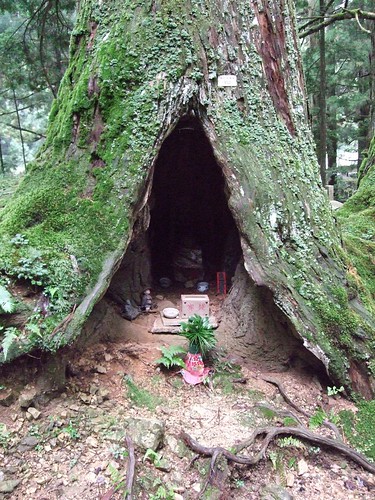Zen Druids
14 Apr 2013James Foster and I were discussing the possibility of Zen Druids today in email. This was the idea of the intersection of the immediacy and focus on presence and mindfulness of Zen practice (among other aspects) with the idea of a sacred or holy nature as present in Druidry, as well as the focus on hearth culture, celebrating the seasons of the year, and other aspects of Druidry as a modern, Neopagan practice.
In part, this came up because I recently joined Ár nDraíocht Féin, A Druid Fellowship (which is popularly known as the "ADF"). I did this in large part because of the work going on at the Solitary Druid Fellowship. This group within the ADF is working with individuals to craft their own rituals and work with a practice as solitary practitioners. Druidry was a path in which I was not involved during my Neopagan years, though the Druidry of the ADF and my own practice within Asatru and as a Wiccan were not far apart, really. As I believe I've mentioned before, I've been a member for a few years of the Shinto shrine in Granite Falls, Washington. I visit it when I'm up in the Seattle area, which is a few times a year to see my daughter and old friends. One of the things that I really appreciated when I visited Japan in 2007 was the extent to which their Buddhism was not wholly distinct from the common Shinto practice and you would commonly see nature oriented shrines and altars to the Kami even in nominally Buddhist places. The recognition of our place in a larger world, the natural world (to compare it against our created world, in a way) was very much present. One of the things that I've found really lacking in Buddhist practice where I am is any real recognition that the natural world is important, valuable, or that we are part of its webs of interconnection. For many Buddhists, we could be living in concrete boxes without any outdoors and it would make no difference to their practice or the relationship with the world. For these Buddhists, the Dharma really is a world denying faith and practice as so many people think of Buddhism. While I'm not an outdoorsman by any stretch, I do enjoy being part of the world and observing it and interacting with it (cue my hundreds of flower photos on flickr).

As I've made clear in other posts, I'm still very much culturally a pagan and my attitude towards the natural world plays a part of it. I've been surprised that this is the case at various points over the years. I thought when I became a Buddhist practitioner that I would leave that all behind but it turned out that the pagan (well, Neopagan) way of doing things and interacting with the world and spirituality doesn't go away easily. I find that elements of pagan culture call to me much more than the way that the Dharma is popularly interpreted in the West. Buddhism in North America smells as much of Protestant Christianity or a need to get away from anything smacking of religion as two of its strongest elements. I don't have a need to incorporate either of those into what I do or practice. This feeling is much of what led to this blog even existing.
So...Zen Druidry. This discussion was of a more personal nature for James and me, since we're Zen practitioners (and he is, in fact, my primary teacher within Zen). How to take what we value from the Dharma and incorporate it in what we value in Neopaganism, specifically in the ideals of modern Druidism... This is an interesting idea and kind of a thought experiment at this point though I suspect that he and I may go further with it.
We tried to come up with what the Dharma, mostly Zen but not just Zen, has to teach Druids and other Neopagans:
- Disciplined, well tried, and well organized methods of meditation (shamatha, vipasyana, mixed, esoteric)
- A focus on practice retreats, alone and with others
- Methods of teacher/student interaction for insight (koan interviews and the koan curriculum)
- Well-developed underlying philosophical/metaphysical structure that supports awakening
- A focus on the goal of awakening to the nature of the world but also on the Bodhisattva Vow, which makes the goal of awakening to be for the good of ALL beings, and which focuses on helping others on the path.
What does paganism have to offer to Zen folks that they might be missing?
- A different view of community/grove/sangha
- A western approach to engaging with nature (important in Japanese Zen moreso than anywhere else)
- An established lexicon for "translating" and understanding the aforementioned philosophy/metaphysics
- A freedom to change/play/innovate with methods and ways of practice or teaching (less rigidity)
- Less of a dogmatic attachment to history and 2,600 years of ongoing tradition leading often to ossification
- Ties to Western cultural roots instead of visions of Asian exoticism and "orientalism" (as a way of making Asia into an "other")
One of the nice things about practicing from the Neopagan (and especially Druid) side of things, is that pagans realize people are putting things together and making up things as they go. They work out new things, inspired by tradition (or romantic ideals of tradition) and keep "what works." Everyone involved with Neopaganism knows that people are making it up and folks are largely fine with it. There is no mystical Druid College off on the Emerald Isle to come offer oversight here. If an organization or grove does things in a way you don't like, you can always leave or make a schism without that much of a problem. Buddhists, especially in the West, are often very conservative in approach and practice. There is little room for trying new things, making stuff up, and jettisoning things that don't work well here. Instead, we become scholars of the Pali Canon and engage in Talmudic interpretation of what the Buddha said. There is a place for such things (and knowledge of history and traditions never hurts anyone!) but it can often feel quite stifling and rigid.
Right now, I'm very tempted to find a way to explain common "calm abiding" (shamatha) and "insight" (vipassana) practices in Druidic (or even larger Neopagan) terminology and combine teaching those and doing some celebratory and other rites into something similar to a short Buddhist retreat. Wouldn't it be interesting for both pagans and open Dharma practitioners to come to a three or four day practice retreat near the woods or the ocean where we combined sitting meditation, instruction in some koan practice, hiking and nature walks with observation, and some actual celebration of being alive in this world and of the world around us. It sounds, to me, to be a lot more fulfilling than either a number of the Dharma practice retreats I've been on (sit...walk...sit...walk...eat...clean...sit...walk...) or just hanging out dancing around a maypole while having a campout. Both of these are caricatures but I do think there is a place where the union of the techniques and views of the Dharma could enhance the experience and views of Druidry and other forms of Neopaganism (and vice versa). I think that the Druids are likely to allow space for this kind of thing to be tried without being too against it. I fear that the Buddhist groups would be far less open to such ideas.
Does this sound interesting to you? I'm sure that Steve and the Zen Odinists would be open to this sort of thing (though they are on the other side of the planet from me).


